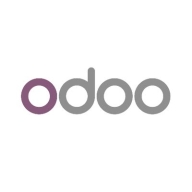

JD Edwards EnterpriseOne and Odoo are competitors in the enterprise software market, each offering comprehensive solutions for various business needs. JD Edwards EnterpriseOne appears to have an edge in global operations with its multi-platform and multi-currency support, while Odoo is valued for its open-source nature and flexibility.
Features: JD Edwards EnterpriseOne has a full suite of modules for warehouse management, manufacturing, finance, and robust customization options without requiring middleware. It supports multiple languages and currencies, which is essential for international enterprises. Odoo offers a user-friendly design with integrated modules such as CRM, inventory, and manufacturing, driven by a strong community that enables extensive customizations.
Room for Improvement: JD Edwards EnterpriseOne can be complex with a steep learning curve and lacks some modern features, relying on third-party tools for certain functionalities. Reporting tools and user-friendliness are areas for enhancement. Odoo, while flexible, faces scalability issues and requires more robust reporting and dashboard features. Integration with third-party apps could also be improved, and its community edition lacks some enterprise features.
Ease of Deployment and Customer Service: JD Edwards EnterpriseOne typically supports on-premises deployment and is best suited for businesses with existing infrastructures. Technical support is adequate but could improve in approachability. Odoo offers flexible deployment options both in cloud and on-premises, catering to various business sizes. Its active community fosters fast iterations and aligns well with emerging business needs, contributing positively to user experience.
Pricing and ROI: JD Edwards EnterpriseOne tends to serve medium to large enterprises with higher licensing costs, although its functionality supports the pricing. A more adaptive pricing structure would improve accessibility. Odoo's subscription model offers affordable pricing, especially for small to medium businesses, though costs can increase with extensive usage. Both solutions promise ROI, with JD Edwards providing stability and long-term benefits, while Odoo's cost-effectiveness aids quicker returns for smaller enterprises.
Previously, there was significant development for customizations, but with JD Edwards EnterpriseOne, the necessary reports are readily available, reducing maintenance costs.
Currently, I manage those tasks independently, which is a significant cost-saving measure for my small business.
They act quickly, and the partners stay up-to-date with the latest innovations.
The technical support is a strong point, and I would rate it an eight on a scale of one to ten.
I would rate the customer service and support of JD Edwards EnterpriseOne a seven out of ten.
Technical support from Odoo is available and eager to help.
It is suitable for any business size, from retail to manufacturing, and can grow with any business.
I rate the scalability of Odoo as eight to nine out of ten.
JD Edwards EnterpriseOne is very stable.
I rate the stability of JD Edwards EnterpriseOne as a seven out of ten.
Stability is very important because any software that supports your business must be available consistently.
JD Edwards should consider implementing more user-friendly interfaces and downloads to aid end users.
I would like to see improvements in the analytical part of JD Edwards EnterpriseOne, specifically in the business intelligence aspect, to enhance its capabilities compared to bespoke solutions.
There is room for improvement on the payroll side, as the solution is not very strong in this area.
Odoo's documentation needs improvement, as there are areas that are not well-documented.
JD Edwards EnterpriseOne is perceived as expensive compared to newer applications.
The pricing for Odoo is affordable, with the solution being significantly cheaper than its competitors like SAP, Microsoft, and Oracle.
The integration between plant maintenance, stores, and financials is highly valued by my customers in the refinery business, as it allows for efficient maintenance processes and easily accessible financial information.
JD Edwards EnterpriseOne manages multiple manufacturing modes in the same process effectively.
The CRM and sales tools are highly effective, with customizable proposal templates aiding client interactions.


JD Edwards EnterpriseOne is an enterprise resource planning (ERP) software solution developed by Oracle. It is designed to help organizations streamline and automate their business processes, including financial management, supply chain management, and manufacturing operations. JD Edwards EnterpriseOne is a highly customizable solution that can be tailored to meet the specific needs of a wide range of industries, including manufacturing, distribution, and services.
With JD Edwards EnterpriseOne, organizations can manage their financials, inventory, order management, procurement, and supply chain processes from a single, integrated platform. It also provides real-time visibility into business performance, enabling organizations to make informed decisions and respond quickly to changing market conditions.
JD Edwards EnterpriseOne Features
JD Edwards EnterpriseOne has many valuable key features. Some of the most useful ones include:
JD Edwards EnterpriseOne Benefits
There are many benefits to implementing JD Edwards EnterpriseOne. Some of the biggest advantages the solution offers include:
Reviews from Real Users
JD Edwards EnterpriseOne is a solution that stands out when compared to many of its competitors. Some of its major advantages are its ability to model, ease of use, customization capabilities, and being able to create reports without coding.
According to PeerSpot user Raymond R., JD Edwards functional consultant manufacturer at Ordina, “The strongest functionality of JD Edwards is the ability to model, in the production that it is, model the production process. If I were to model the bill of materials and production routing, then that's one of the strongest parts of JD Edwards.”
Khalid J., Senior Manager - Group ICT at Gulf Aluminium Rolling Mill Co. B. S. C., says, "We find the ease of use, customization, and user interface valuable."
In addition, a Project Leader at a tech services company expresses, "With the new versions, it has become very user-friendly. We have integration with mobiles, and we have cloud-based solutions. There are a lot of things that can be done by front-end users without technical knowledge. They can create reports without having to do any coding, and it's very good now."
Odoo is a suite of open source business apps that cover all your company needs: CRM, eCommerce, accounting, inventory, point of sale, project management, etc. Odoo's unique value proposition is to be at the same time very easy to use and fully integrated.
We monitor all ERP reviews to prevent fraudulent reviews and keep review quality high. We do not post reviews by company employees or direct competitors. We validate each review for authenticity via cross-reference with LinkedIn, and personal follow-up with the reviewer when necessary.